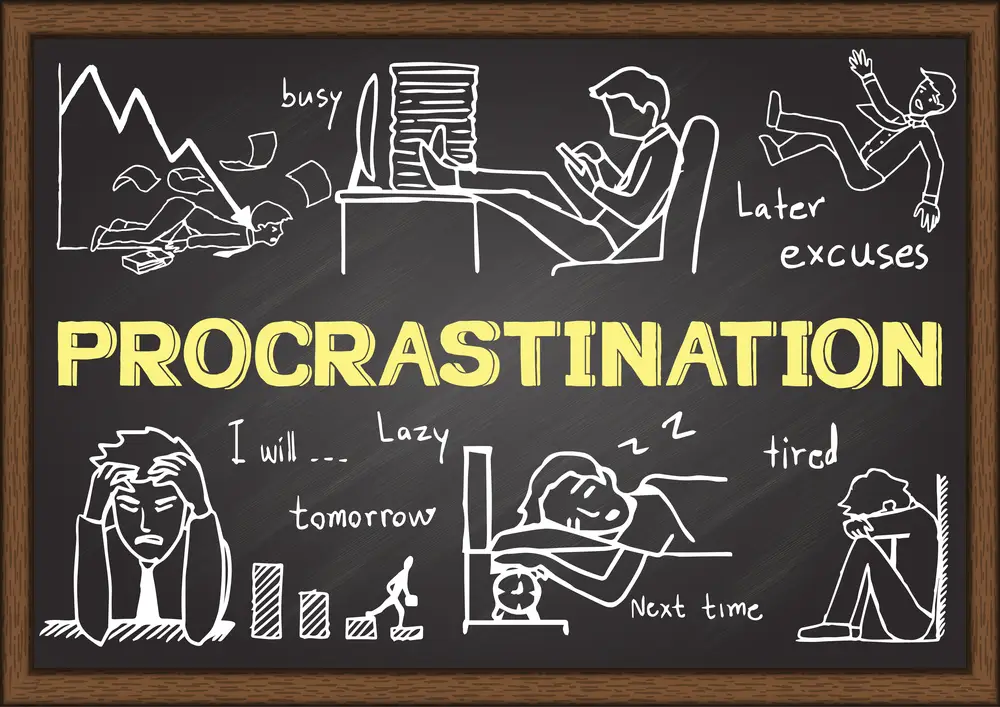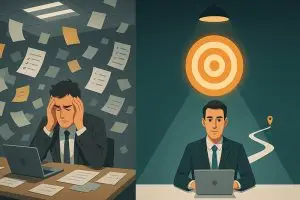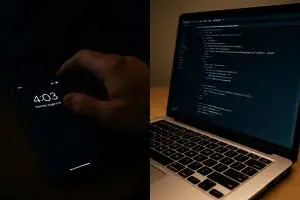How to end procrastination now? It’s a common question.
Look. We’ve all been there.
That nagging feeling that we should be doing something, but for some reason, we can’t seem to get started. Hours drift by and before we know it, the day is over and we still haven’t accomplished anything. Except maybe watching some The Office re-runs.
If this sounds familiar, you’re probably dealing with procrastination. But don’t worry, you’re not alone. In fact, recent studies suggest 85% of us have had procrastination problems at some point.
Not only that, I recently read an article from the Journal of Social Psychology. According to that research, one in five people is a chronic procrastinator. That means that in the US alone, there are over 51 million chronic procrastinators.
So don’t feel bad. You’re in good company.
And, we all know that the first step in solving a problem is admitting you have one in the first place.
But really, why is procrastination a problem?
Procrastination is putting something off until later that you should do now. It’s something that we all do from time to time. But it can lead to all sorts of problems. Here are the top 3:
1. Procrastination Causes Stress
Procrastinating causes stress. When you put something off until the last minute you’re making a trade. Time for quality. The truth is that when you put tasks off long enough, you can’t finish on time without sacrificing quality.
It’s like a kid cleaning his room. His room is a mess and he knows it. His mom warned him to clean it up by 3 PM, otherwise, he’d have to skip his baseball game. But, he spends all day playing video games.
Then, at 2:30 PM he realizes he’s going to be in trouble. So he shoves everything under his bed and calls the room “clean.” We all know the work isn’t done well, it’s only looks done. And now he’s hoping mom never looks under the bed… that’s the definition on self-inflicted, procrastination-caused stress.
Rushing through projects only makes things worse. By adding unnecessary time pressure, the quality of work will suffer. And knowing that, by itself, adds more pressure.
2. Procrastinating Makes You Less Productive
When we put off tasks, it often affects our performance. This is because we start to feel overwhelmed and stressed, which makes it difficult to focus on the task at hand. As a result, we tend to make more mistakes and take longer to finish the task. This can have a negative impact on our work or school grades, as well as our professional reputation!
In one large study, people who procrastinate had $15,000 lower salaries. There were also employed for a shorter duration. And they were also more likely to be underemployed (or even unemployed).
Procrastinators also reported higher levels of stress and burnout. This, in turn, made it harder for them to put in long hours at the office. The net result? Lower quality of life and lower productivity.
3. Not procrastinating can save you money
Another danger of procrastination is that it causes you to lose out financially. We talked about the potential impact on your salary above.
For example, if you procrastinate on your taxes, you’re going to get hit with a penalty. This, of course, can be hundreds or even thousands of dollars.
In addition, let’s talk about investing for the future. The longer you procrastinate on making investments, the longer it will take you to build a nest egg. That leads to having to wait longer to retire. It could also leave you with less money at retirement. This may be the difference between living a comfortable life and having to cut back on expenses.
Listen, procrastinating is a problem. It can hold you back from achieving your goals. Remind yourself of these consequences of procrastination. Use them to help motivate yourself to complete tasks promptly! So stop procrastinating and work towards making progress!
Now, you need to understand the root cause of your procrastination.
Most people that want to learn how to end procrastination now ignore finding the root cause. They are looking at the symptoms, but not the causes.
Fear, the Root Cause of Procrastination
If you’re like most people – myself included – procrastination grows from fear. We fear failure, we fear judgment, and/or we fear losing our comfort zone. These fears cause us to shy away from working towards our goals. And instead, we do something else that is easier and less intimidating.
But the good news is that fear can be overcome. And once you understand how fear is holding you back, you can start taking steps to overcome it. And then you can finally end procrastination for good.
Important note: You’ll notice that many of these tips fit hand in glove. They work together. These things compound to kill procrastination and send your productivity to the moon!
11 Amazing and Terrific Tips that show you How to End Procrastination Now
Be Clear About Your Goals.
One of the best ways to overcome procrastination is to be clear about what you want to achieve.
So if you want to know how to end procrastination now, then start here:
What are your goals?
Write them down and keep them in a visible place. This will serve as a constant, visible reminder of what you’re working towards. And this will help you stay on track.
Break Down Your Goals Into Smaller Tasks
If you have trouble focusing when working on a task, break the project into smaller steps. By breaking things down into their component parts, the project becomes simpler. This will help take some of the pressure off yourself and make it easier to get started.
Also, remember this. There are no limits as far as how many small parts can come together in order to create something big!
For example, if your goal is to write a book, you can’t sit down and write the whole thing all at once. It’s overwhelming.
So you start by writing one chapter. To do that, you start with writing one paragraph. And the first paragraph comes after writing the first sentence.
Once that’s done, write the second sentence. This will help keep you motivated and make progress towards your ultimate goal.
The small steps are how we get there!
Bonus tip: If you’re having trouble getting started on a task, try using a timer. Set the timer for 20-30 minutes and work on the task until the timer goes off. No thinking about it. Just do it (thanks Nike!) This will help make the task at hand feel less daunting and more manageable.
Set a Deadline For Yourself.
Next, when thinking about how to end procrastination now is to set a deadline for yourself.
There’s a deadline for the entire task. But when you break down things into smaller parts, set a deadline for each of them.
When you have a deadline, it puts pressure on yourself to get the job done. You’re using your propensity to procrastinate in your favor. That pressure is helpful in getting you moving and taking action.
But don’t set a deadline that’s impossible to meet! This will only cause stress and frustration, which will lead to more procrastination. Instead, try setting a deadline that’s challenging but achievable.
Create a Timeline for Your Goal.
Along with setting a deadline, it’s helpful to create a timeline for your goal as well.
A lot of people ask, “What is the difference between a deadline and a timeline?”
The main difference is that a deadline refers to an endpoint for your goal. And the timeline refers more to how you’re going to get there. When creating your timeline, think about how long it will take from start to finish. Then break things down into chunks so that each step seems easier and less overwhelming.
Placing each task on a timeline gives you an idea of how much time you have to complete the task. You can also see how much work you need to do each day to meet your goal.
For example, you might say that your goal is to have a profitable website by the end of the year. Now, you break that goal down into a timeline of 12 months.
Then you break each month down into smaller chunks.
So during the first week of the first month, you may have to do research to flesh out your ideal customer avatar. During the second week, you may want to figure out how many pages and posts should be on your site by the end of that year.
In the third week, you might up with content ideas and set up an editorial calendar. This way you can see exactly how much work needs to get done each day.
The same goes for any other type of project. Whether it’s starting a blog, creating a product, or even editing photos. Create timelines with deadlines for each task. Everything will stay organized and moving forward instead of feeling stagnant.
Progress creates habit. It’s one of the keys for people wondering how to end procrastination.
Find Someone Who Can (and Will) Hold You Accountable.
Next, find someone who will hold you accountable.
Having someone there to help keep you on track and productive is invaluable.
And if they’re willing to check in with you regularly (daily or weekly) that’s even better! This way you know that someone is keeping an eye on your progress and expecting results.
This can be a friend, family member, or coworker. The key is to find someone who will push you to get the job done and won’t let you slack off.
If you don’t have anyone like this in your life currently, try looking for an online forum or Facebook group. There are several that are full of people working towards the same goal as you. This can give you a sense of community. And you’ll get the support that you need when it feels like you’re the only one struggling.
Take a Break.
Take a break. When you feel like you can’t focus or that the task at hand is too daunting, take a break. Really.
This can be anything from going for a walk to meditating or stepping away from your computer for a few minutes.
The key is to not let yourself get overwhelmed and bogged down by a project or task. When you’re feeling frazzled, it’s tough to focus on anything at all. So take some time for yourself.
Then come back to the task with fresh eyes and a new productive perspective. And the productive perspective is a massive key for those looking to end procrastination.
My preferred method of taking breaks is to schedule them. I schedule a 10-minute break every hour, which gives me enough time for a quick walk or to do some meditation.
This is a modified Pomodoro Technique. The Pomodoro technique is a time management strategy. You work for 25 minutes and then take a five-minute break.
After four Pomodoros (25-minute segments), you take a longer break of 15 to 30 minutes.
So instead of 25 minutes on and 5 minutes off, I’ve found I’m more productive with 50 minutes on and 10 minutes off.
Play with it and see what works for you.
Important! Set Time Limits for Your Breaks.
Either way, the break has to end, otherwise, you’re… well… procrastinating.
So next on our list of ways to overcome procrastination is to set a time limit for your break.
And then create a list of potential non-project-related things you could do on the short break. This way you’re not sitting around wasting time and getting nothing done.
You’re still taking a break, but you’re doing something productive with that time. Like I said above, I might take a quick walk or meditate. But I also may get some clothes in the laundry, or tidy up around the house (when I’m working from home).
But whether it’s going for a walk, meditating, or checking your email, sure the break is productive. And that it doesn’t last too long.
If you know that you can only take a 5-minute break, then you’ll be more likely to be efficient with that time. And when it’s time to get back to work, you won’t feel as overwhelmed because the task at hand is shorter.
Eliminate Distractions.
One of the main reasons people procrastinate is because they are easily distracted. If you’re working on a specific task and something else comes up, it’s easy to get sidetracked. And before you know it you’re binging The Office on Netflix or watching cat videos on Youtube. What you’re not doing, for sure, is being productive.
This is why it’s important to remove distractions while you’re working. This means turning off your phone. It means closing all other programs on your computer. Close your email. Close Facebook, Instagram, and TikTok.
If possible, work in a quiet place where you won’t have interruptions. If that’s not possible, try using headphones to block out any noise. Or use an app like Freedom that blocks websites and apps for a set amount of time.
Listen, I know that this is hard.
My biggest distraction was email first thing in the morning.
I made a commitment to not check my email before my first big task of the day is done. Email (AKA “Other People’s Problems.” What, you thought OPP meant something different?) used to distract me.
My excuse was that I was being helpful. But I was helping those people reach their goals, not helping me reach mine.
Reward Yourself for Being Productive.
It’s important to reward yourself when you accomplish a goal, regardless of how small you think it is. This can be a great way to motivate yourself. And it’s a great way to keep you motivated when times are tough.
Do something nice for yourself when you reach the end of a goal. It could be going out to dinner with friends. Or for me, it might be buying a nice bottle of rum, some new Olukai flip-flops, or a new pair of shoes or sunglasses
You’ll be more likely to work toward your goals if you have some kind of reward at the end in mind. Plus it keeps you motivated and driven so that each day isn’t just another slog through your task list. Instead, it’s an exciting adventure towards reaching your long-term objectives.
Cameron, my oldest son, had been trying to break a bad habit. When he asked me if he could use his money to buy a video game, I turned the tables. I offered to by the game for him if he didn’t do the habit for a week.
Now, he’s changed a behavior that he wanted to improve. And he has a new video game.
Rewards work to end procrastination.
Take Care of Your Physical Health.
This one is so often overlooked for those wanting to end procrastination.
Your physical health can also play a role in how productive you are. If you’re not feeling well, it’s going to be difficult to focus on anything else.
Make sure you get plenty of rest and exercise. Be sure to eat healthy foods so you have enough energy to do the work. Be sure to get enough sleep and exercise. Meditate.
This will help you feel energized, which is another great way to stay productive. You’ll also think more clearly, which is another great way to overcome procrastination.
Most everything I listed there you can do during one of your timed breaks.
And, at the end of the day, you’ll be more productive.
Create a To-Do List for Each Day the Night Before.
Create a to-do list for each day. But starting making them the night before.
Before you lay down to go to bed, sit down and write a list of everything that you want to get done the next day. Then rank your tasks from most important to least important.
This way you have a plan and can see what still needs to get done.
When everything is on paper in front of you, it’s easier to stay focused and avoid distractions.
Plus, crossing items off your list feels amazing!
I make monthly, weekly, and daily to-do lists. That way I’m always focusing on my short and long-term goals.
I put it all into the Motion app.
It’s my favorite apps for making lists among other things. But there are tons of great options out there that you can find by searching the app store.
If you’re still fighting with procrastination after trying these strategies, it may be time to hire a coach.
A coach can help you figure out the underlying reasons for your procrastination. And they can offer other techniques and strategies to help you overcome it.
This can be a great way to finally get the help you need to end procrastination once and for all.
Want more? Check out how I overcame my own procrastination problem.






